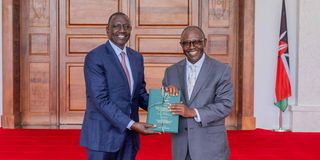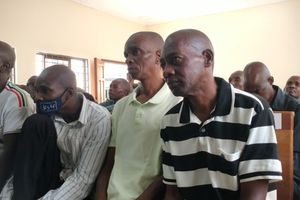
President William Ruto receives the Shakahola taskforce report at State House on July 30, 2024.
The Presidential Taskforce on the review of the legal and regulatory framework governing religious organisations in Kenya following the Shakahola massacre has finalised its work, proposing a raft of measures to mitigate against pious extremism.
The taskforce, in its report presented to President William Ruto on Tuesday, has recommended the enactment of statutes for religious organisations, establishment of a Religious Affairs Commission (RAC) and adoption of a hybrid regulatory model of self-regulation and government oversight.
“The recommendations are geared towards the safeguarding of the exercise of the fundamental freedoms of religion and association while balancing the enjoyment of these freedoms with the xxii preservation of public interest, safety welfare and good as protected by the Constitution,” said the 18-member committee chaired by Rev Mutava Musyimi.
The RAC, which is to be established by an Act of Parliament, will act as an oversight body to all religious organisations.
“The primary role of the commission is to provide a convergence point between the state and religious organisations for the sole purpose of oversighting religious organisations,” said the report.
The composition of the proposed commission shall consist of nine members; the chairperson and the majority of members who will be drawn from the religious sector.
The taskforce also proposed the formation of Umbrella Religious Organisations for self-regulation through the bodies which are to be anchored in the proposed law.
The responsibility of monitoring and reporting deviant religious leaders will be vested in these Umbrella bodies, which should also be given the mandate to set standards, monitor the activities of member religious organisations and serve as intermediaries between religious groups and government institutions.
“This would ensure that religious bodies like all public sector organisations strictly comply with all public sector regulations and standards, including the principles of public finance, and appropriate sanction measures for non-compliance,” the report said.
The Rev Musyimi-led taskforce also recommended that the existing structure of interfaith relations operating at the national level be cascaded to the counties and that the proposed RAC should also develops a model code of conduct and a model Constitution for adoption and use by religious organisations.
According to the committee, the legislative and policy framework proposed for the formation in their report shall cure the gaps existing in the current structure.
The team further recommends the amendment of the Kenya Information and Communication Act (Kica) and other relevant statutes to strengthen a framework for regulating religious content in media within the context of the Constitution.
'Currently no regulation online'
The task force observed a lack of regulation on online broadcasting by religious organisations despite the increased use of online platforms such as YouTube, Netflix, social media networks and other over-the-top services to broadcast content.
It also noted that there are no provisions in Kica to regulate online broadcasts, which continues to pose a challenge in monitoring the transmission of content that displays religious extremism, radicalisation or the infringement of fundamental rights and freedoms under the pretext of religion.
“To mitigate against the risk of religious extremism in online broadcasting, it is imperative to have clearly defined legislative prescriptions against distinct broadcast and media channels or programmes that air religious content,” the report said.
This would require that any content aired would be subjected to the provisions of both the Films and Stage Plays Act and Kica Act.
“The existing legal framework has gaps and it does not adequately address religious extremism, sects, cults and other similar outfits in Kenya that engage in practices detrimental to individual health and safety, the public interest and our national values,” the report said.
Religious civic education for Kenyans
It has also recommended the development and revision of materials for civic education that elucidate the rights and responsibilities of religious organisations and citizens and underscore the perils of religious extremism. The team observed that civic education and educational curricula are critical in sensitising Kenyans with a view to identify, avoid, or exit religious extremist organisations, sects, cults as well as other similar outfits.
The civic education curriculum to be developed should focus on parents, instructors, clergy, educational institutions, government agencies and the general populace to create awareness on extremism, cultism, and radicalization, which should include how to identify, avoid or leave religious extremist organisations.
This should also include creation of dialogue initiatives, interfaith and intra-faith fora and platforms to discuss religious freedom and tolerance to prevent negative profiling and enhance national cohesion.
President Ruto formed the taskforce last year after hundreds of members of the Good News International church, associated with cult leader Mackenzie, died of starvation at the Shakahola forest.
Mackenzie is said to have manipulated the followers before ordering them to starve to death to meet Jesus.
Mackenzie and 94 others who were arrested over the mass death in Shakahola are currently facing several charges of murder, manslaughter radicalisation and offences under Prevention of Terrorism and Children Act.








